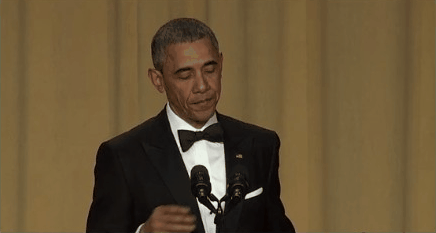
No One Wants To Study How Obama Amused the Whole World by Being a Comedian
A complete video of the White House Correspondents’ Association’s dinner was broadcast onto the Chinese Internet with Chinese subtitles, attracting a large Chinese audience. Speaking objectively, this tradition of humor within high-level U.S. political circles is also very peculiar in the Western world – European politicians are very careful to speak and are much more reserved. Within the Asian countries that have been drawn into Western political systems, like Japan, politicians are especially meticulous when speaking.
Prior to the president’s speech at the White House, a “propaganda piece” was broadcasted which contained a collection of footage of Obama acting foolish during these eight years, for example when he mistakenly said that there were 57 states instead of 50. It cannot be said that the president meeting and integrating with reporters in such a way is not legendary within political circles worldwide.
But is this a good thing? Speaking from a perspective of admiration, it’s very cool. Thinking about it roughly, it makes you jealous that U.S. politics can operate so lightheartedly. I bet that Obama has made a good impression on more than a few people worldwide.
However, if the leaders of my own country ever ostentatiously joked around and told stories to string together a speech or did such a ridiculous performance like he did with the White House officials, I bet that from Germany and France to England, back to Japan, Korea, Singapore, Malaysia and Thailand, India and Brazil, as well as the Commonwealth of Independent States, the public would be unable to accept it. If the people of these countries saw their own leaders put on a show like that at a forum, it would be a shock that they were so immoral and they would be suspicious of why they were running wild.
The White House Correspondents’ Association’s annual dinner became a tradition early on, bringing the outside world new curiosity and reflections on the characteristics of U.S. internal politics. But I have to admit that these reflections are marginal and far from becoming serious, because that is the place where the nature of politics is and the rigid requirements of the public of each country are difficult to change. The most important thing is that they will bear responsibility to solve problems for the country, and people do not have their main hope set on politicians who have a strong ability to wisecrack.
In reality, there are too many times when U.S. politicians can obtain votes for themselves and their parties through showing off. Now the U.S. president must first be a master of speeches and performances. Their strong lesson in performance is evident through the process by which they enter the White House and safeguard the throne. For example, all of the jokes in what has been called the president’s “final performance” of his term have not only all undergone the group’s meticulous editing and obviously required Obama’s prior practice, but had few other implications other than getting laughs. Through this banquet, Obama did some personal PR in order to make a cushion for next year after he has left the White House so that he can maintain influence; and to some extent he is also planning to seek gains for the Democratic Party.
The side view tells us that if the president can meet with reporters in such a relaxed manner, then the U.S. president’s rights must be relatively limited. Speaking generally, he might be unable to be the master of this country’s fundamental policies. Many people believe that the core of U.S. rights is Wall Street, in the palm of the capital's hand, and that the president is the public spokesperson for the interests of capital, a notion that probably has some rationale to it. Of course, some people might believe that the president ought to not have any rights, that he should lack accomplishments as he does now and that he ought to do his utmost to please the public, which is another problem.
The structure of the world is positioned in a deep state of adjustment, global problems are bringing widespread pressure and many countries are facing severe challenges. You can see that U.S. society is also quite anxious, but the president’s ability to treat heavy matters lightly to a certain extent makes people able to remember that the president accomplished a few matters and his wisecracks actually made a lasting impression on people, which maybe is a special leisurely quality of the U.S.’s political system.
In the age of globalization, markets are opened up and important information can always travel around the world, but the historical logic developed by each country is not so easily unified, and the countries are realistically still independent of each other. This means that laughs were attracted by Obama being a comedian, but almost no other country’s leaders will want to follow his example.
